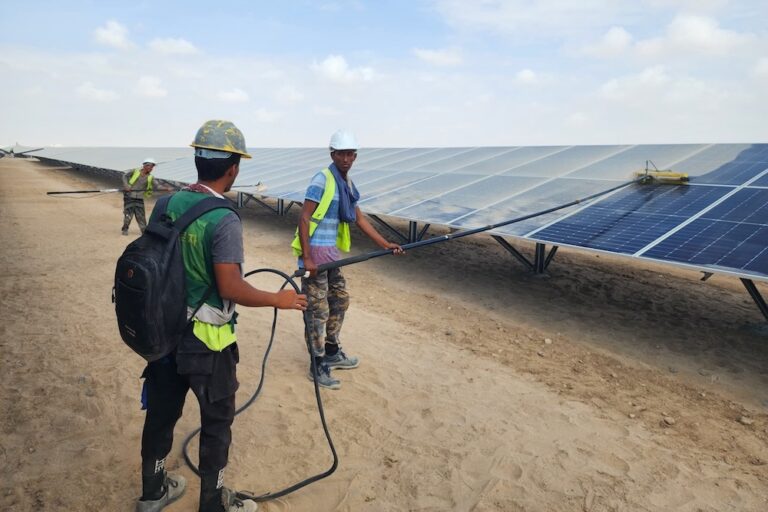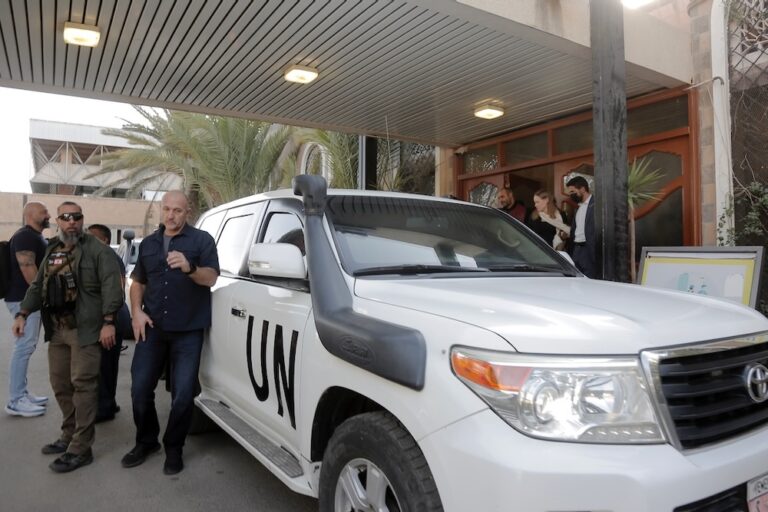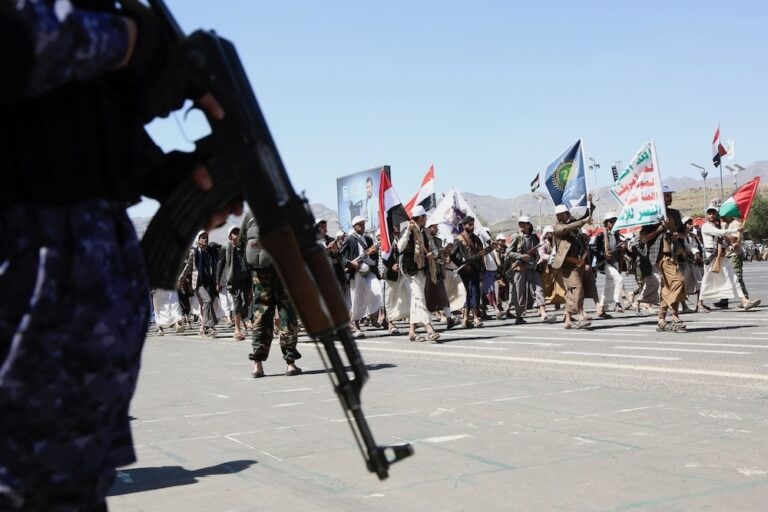SOURCE: Arabic Network for Human Rights Information (HRinfo), Cairo (HRinfo/IFEX) – HRinfo closely observed the recent Yemeni elections, particularly in relation to the deterioration of freedom of expression and freedom of the press. HRinfo regrets to conclude that the Yemeni government has spared no effort to hinder the nascent democratic experiment in Yemen. Some human […]
SOURCE: Arabic Network for Human Rights Information (HRinfo), Cairo
(HRinfo/IFEX) – HRinfo closely observed the recent Yemeni elections, particularly in relation to the deterioration of freedom of expression and freedom of the press.
HRinfo regrets to conclude that the Yemeni government has spared no effort to hinder the nascent democratic experiment in Yemen. Some human rights organizations observed several violations during the electoral process. As well, further restrictions were imposed on freedom of the press and many websites were blocked. The latter is summarised by HRinfo below:
1. Al-Mostakela Forum
“They can block our website, but they can never hide the truth”
The comment above was posted by a member of the now-blocked Yemeni Al-Mostakela forum, http://www.mostakela.com , a traditional text web forum which has about 1450 members. The Yemeni government blocked the website on 18 September 2006, only two days prior to the beginning of presidential and local elections. The website is being blocked by the state-owned IT Yemen The Net Company. Members who are not professionals can no longer access the forum, although some experienced members are using proxy software to bypass the blocking. Those who were able to log in criticized IT Yemen The Net Company and the Telecommunication and Information Technology Ministry, which is claimed to be its supporter, for blocking the website.
2. Nass Press website
Since its foundation early in 2000, the People Press Institution has occupied a unique position in the field of print media in Yemen. Therefore, it was encouraged to construct Nass Press website, which became a well-known website for those interested in Yemeni affairs. The website provides a space for posting different perspectives. Recently, Nass Press carried articles reflecting intense rivalry between the supporters and the opponents of the two major nominees (the current president and Popular Congress Party candidate, Ali Abdullah Saleh, and the candidate from the opposition Joint Meeting Parties, Faisal Ben Shamlan). The Yemeni Telecommunication and Information Technology apparently became aggravated with the huge number of critical comments on the Nass Press website, http://www.nasspress.com . Although the website did not violate political criticism rules, the ministry blocked the website during the period from 13 to 24 September 2006. Then the website was unblocked after Ali Abdullah Saleh won the presidential elections.
3. Hewarye web forum
This may be the first time that Yemeni Internet users have experienced the blocking of a website without any apparent motive (setting aside the question of the legitimacy of such actions even when the motive is apparent). Hewarye ( http://www.hewarye.com ) is a relatively new website. It was constructed only few months ago and it is well-known for supporting the Yemeni president. However, the website was blocked on 18 September 2006 without any explanation or the announcement of any resolution by the Yemeni Telecommunication and Information Technology Ministry or IT Yemen The Net Company. This reinforces the impression that blocking decisions are arbitrarily taken.
4. The Yemeni Council website, http://www.al-yemen.org/
Read the HRinfo press release in Arabic: http://www.hrinfo.net/press/2006/pr0911.shtml
Read the HRinfo press release in English: http://www.hrinfo.net/en/reports/2006/pr0911.shtml
5. Yemen Sound website, http://www.yemen-sound.com
Read the HRinfo press release in Arabic: http://www.hrinfo.net/press/2006/pr0911.shtml
Read the HRinfo press release in English: http://www.hrinfo.net/en/reports/2006/pr0911.shtml
The independent and opposition Yemeni press is known for its boldness and sharp political criticism. Many Arab states seek to restrict freedom of the press by questioning and charging journalists with crimes. In addition to such traditional methods, the Yemeni authorities illegally punish and threaten journalists. They even go beyond this by abusing journalists physically or threatening them via phone calls using telephones for which the caller’s number is unidentifiable.
During the last 20 days, HRinfo monitored many violations in the electoral process. They are:
1. Khaled Al-Alwani
The Yemeni Press and Publication Prosecution Department has not announced why it summoned, on 7 September 2006, “Al-Assema” newspaper editor Khaled Al-Alwani, or the reason why he was referred to the West Capital Secretariat Court in Sana’a. Even worse, Yemeni security forces searched Al-Majd Printing House, which prints “Al-Assema” newspaper, using a resolution issued by the public prosecutor. That took place without the permission of the competent court and without declaring the reasons justifying such an action. Consequently, the resolution seems to have resulted from political bias in favour of the president, Ali Abdullah Saleh. Thus, it is an obvious violation of freedom of the press, in addition to causing “Al-Assema” newspaper to suffer severe losses because it failed to be distributed on time.
2. Mohamed Sadiq Al-Adeny
According to statements by human rights activist and journalist, Mohamed Sadiq Al-Adeny, he has experienced 18 incidents of harassment by Yemeni authorities in the last eight years. The most recent was his being sentenced to three years in prison and ordered to pay a fine amounting to 1,200,000 Yemeni Riyals (approx.: US$6,153), by the notorious Aden Court. He was not summoned for trial and was not informed of the dates of trial sessions. This demonstrates the relationship between this trial and Al-Adeny’s famous article entitled “Oh President, Silence them!”, published in August. In this article, Al-Adeny criticized the form of democracy practiced by President Ali Abdullah Saleh’s administration, which led to corruption in Yemen.
3. Samia Al-Aghebery
Samia is a journalist at “Al-Wahdawi” newspaper. The attempts to defame Samia Al-Aghebery in statements displaying a lack of press ethics and honour by some semi-official newspapers did not succeed in June 2006. Consequently, the authorities resorted to worse methods by having someone break into her house in a late hour on 21 September to obtain the originals of documents showing the recount of vote results in some electoral committees, which Samia had faxed to several websites. The authorities threatened her and insulted her as a direct result of her journalistic activity during the elections.
4. Abdul Hafiz Ahmed Mogab
Mogab is a freelance reporter with several newspapers and news websites. He was arbitrarily arrested by Omran security forces on 5 September. Several soldiers threatened to kill him and he received the same threat via a telephone call from an unidentified number. The threats derive from his having investigated violations in the Omran directorate elections.
5. The confiscation of Al-Tagheir newspaper
On 17 September, Yemeni security forces in Aden confiscated almost 1,000 copies of “Al-Tagheir” newspaper, without a court order or any legal justification. This was done to prevent Yemeni citizens from reading [the views of the Joint Meeting Parties (JMP) – opposition parties which publish the newspaper]. The Executive Committee of the JMP informed the Press and Publication Prosecution Department about the confiscation and called for an explanation for this action and its cessation. However, no action was taken to deliver justice to the affected or to hold those responsible accountable.
HRinfo believes that the above 10 violations, either investigated directly by HRinfo or documented by volunteers inside Yemen who then sent the information to HRinfo, are contrary to the Yemeni Constitution and illegal. In addition, they violate Article 19 of the International Covenant on Civil and Political Rights, signed by Yemeni government. These violations require the immediate intervention of the Yemeni Press and Publication Prosecution Department, the body responsible for defending the press and journalists against those who violate their rights. The Department is usually more active when investigating alleged violations committed by journalists.
HRinfo also believes that these recent violations took place at a critical stage in the history of Yemen; that is, during the presidential elections. Governmental authorities were supposed to be more committed to neutrality and transparency, rather than display such obvious bias in favour of the president. This makes evident the fact that the Yemeni government engages in the same methods of arbitrary control adopted by most Arab states. The main characteristics of this control are fettering the press and violating the right to freedom of expression and the right to exchange information.
Therefore, HRinfo calls upon the Yemeni president not to start his new period in office by overlooking such serious violations. HRinfo also urges the president to conduct fair investigations into these incidents, in addition to implementing his promises to respect freedom of press and the freedom of expression. HRinfo hopes that these electoral promises will not be broken.


